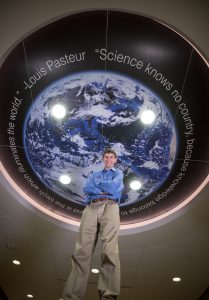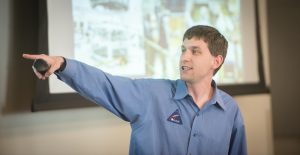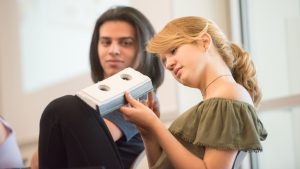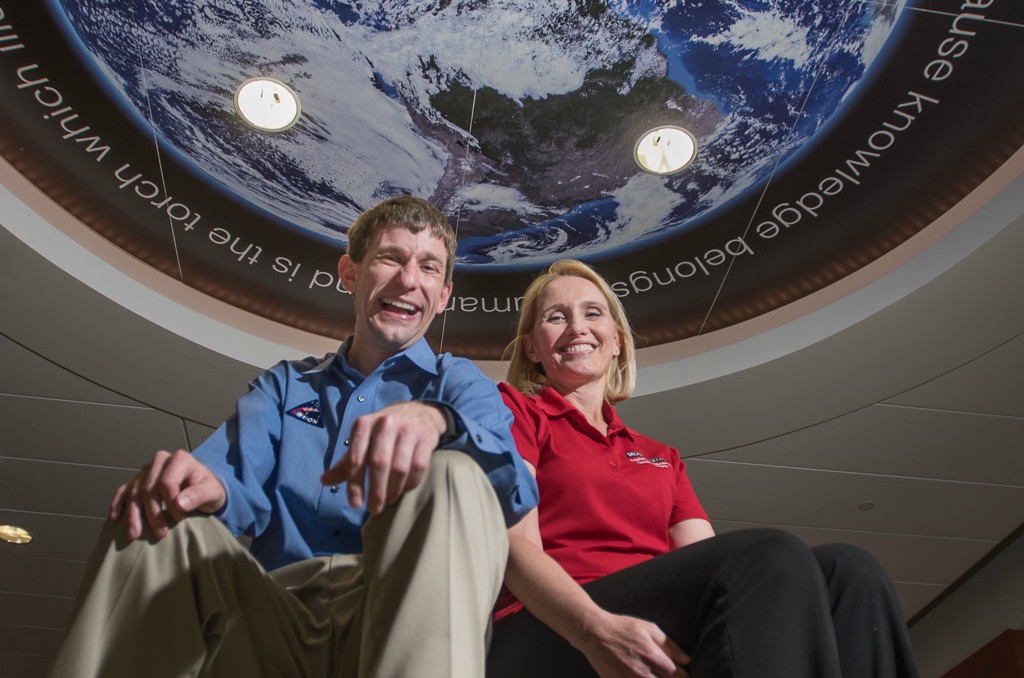As a kid, Barry Bohnsack always dreamed of working at the Kennedy Space Center. He just had to figure out how to make it happen.
But somehow, through pluck and a lot of determination, it did. And, today, the 31-year-old Valencia grad is living his dream – working at KSC for Lockheed Martin, where he serves as a program planner for the Orion Spacecraft program. The goal of Orion is to one day carry astronauts to Mars.
While the public seems focused on rockets bearing satellites, Barry is thrilled to talk about NASA’s big plans — a mission to Mars. And he’s equally thrilled that he gets to be part of it.
“I got hired on the Orion program because I have a financial background,” says Barry, who earned a degree in economics from UCF in 2009. “Most of our finance people are in Denver..… but you have engineering managers who have to turn in financial reports. So that was my first job to help them with their financial reports.”
In addition, he also handles some supply chain management duties and creates staffing and manpower plans. He’s also involved in planning for the Mars Base Camp 2028 project.
But how Barry got from his Osceola County high school to his dream job is a tale of determination and networking. And he’s proof, he says, that networking pays off.

Barry’s interest in space dates back to his childhood, but he credits his job in the space industry with the work he did as a teen and college student with robotic competitions.
As a member of the Harmony High School robotics team, Barry eventually became president of the team – and handled many of the business aspects of the team’s work, including marketing. Although the competition is ostensibly about robotics, students are also graded on business plans and community engagement – so they are encouraged to go into the community and talk about science and engineering. For Barry, that was the exciting part. He loved to talk to others about space and science.
And, somewhere along the way, he realized his path to NASA might not be what he originally envisioned.
“While I was passionate about science and technology and working with engineers, I found that my best skillset was in marketing and business,” says Barry.
Barry, who’d taken dual enrollment classes at Valencia in high school, enrolled in Valencia and soon became a member of Phi Theta Kappa, the honor society for community college students. And in April 2017, Barry was selected as one of the top 20 community college students around the country – and was featured in USA Today’s All-USA Community College Academic Team.
“Barry was a special student because he was so passionate about everything that he did. He always brought all of his energy to whatever project he happened to be working on at any given time,” says Dr. Melissa Pedone, dean of math at the Osceola Campus who served as the campus Phi Theta Kappa advisor while Barry was a student. “There is no better example of this then his commitment to supporting robotics programs that promote STEM education. He was involved in one at the high school level and once he graduated he stayed involved as a mentor — and still is to this day. It was his work with the public school and youth robotics programs that got the attention of the All Florida and All USA Academic competitions that led him to be named to the top 20 list.”
But Barry’s networking was just his way of making friends – in a field that he found fascinating. And all those contacts began to pay off in college. For instance, the friends he made in robotics competitions told him about a summer job at Camp Kennedy Space Center – where he loaded kids into simulators and answered their questions about KSC.
During college, Barry continued to volunteer with local high school robotics teams, including Exploding Bacon, an Orange County robotics team sponsored by Lockheed Martin. There, working side by side with the high school students and their Lockheed mentors, Barry made connections that helped him land an internship at Lockheed Martin. And, after graduating from UCF, he landed a full-time job in the finance department at Lockheed’s Orlando office.
Luckily for Barry, that led to a job in Lockheed’s offices at Kennedy Space Center – where he’s the only finance employee in a sea of engineers. And he’s happy as a nerdy space clam.

“I always knew I wanted to work for a company that had something to do with the space program,” says Barry. “Back when I was in high school, the Valencia scholarship committee asked me what my plans were. I said I had no intention of leaving Florida. Why would I when there were so many opportunities here, especially at the Kennedy Space Center?”
And even though he didn’t study engineering, Barry found his path to the Space Center another way. That’s why he advises students that they can still pursue their dreams.
“There are many, many disciplines out here. If you are an engineer, there are many types of engineers. There are also a bunch of people here with supply chain management backgrounds,” he says. “Any company in the world that you want to be a part of needs business people. The same thing happens with human resources. There has to be a human resources department – so even if you’re in HR and you want to work in the space industry, there will be a place for you.”

Today, he continues his passion for robotics by serving as a volunteer announcer during FIRST competitions – and has been an announcer at the FIRST world championship competition. He also speaks at Valencia and other schools to tell kids about the Orion program and spark their interest in space.
If he has any advice for Valencia students, it’s this: “You have to go find mentors; you have to go network; you have to go find people who are engaged in what you want to be doing in the future,” he says. “I was spending hundreds of hours each year volunteering with people who were in the field that I wanted to be in. The grades are enough for you to get your resume looked at.. and that is it. You need to get out there and meet people and make connections.”
